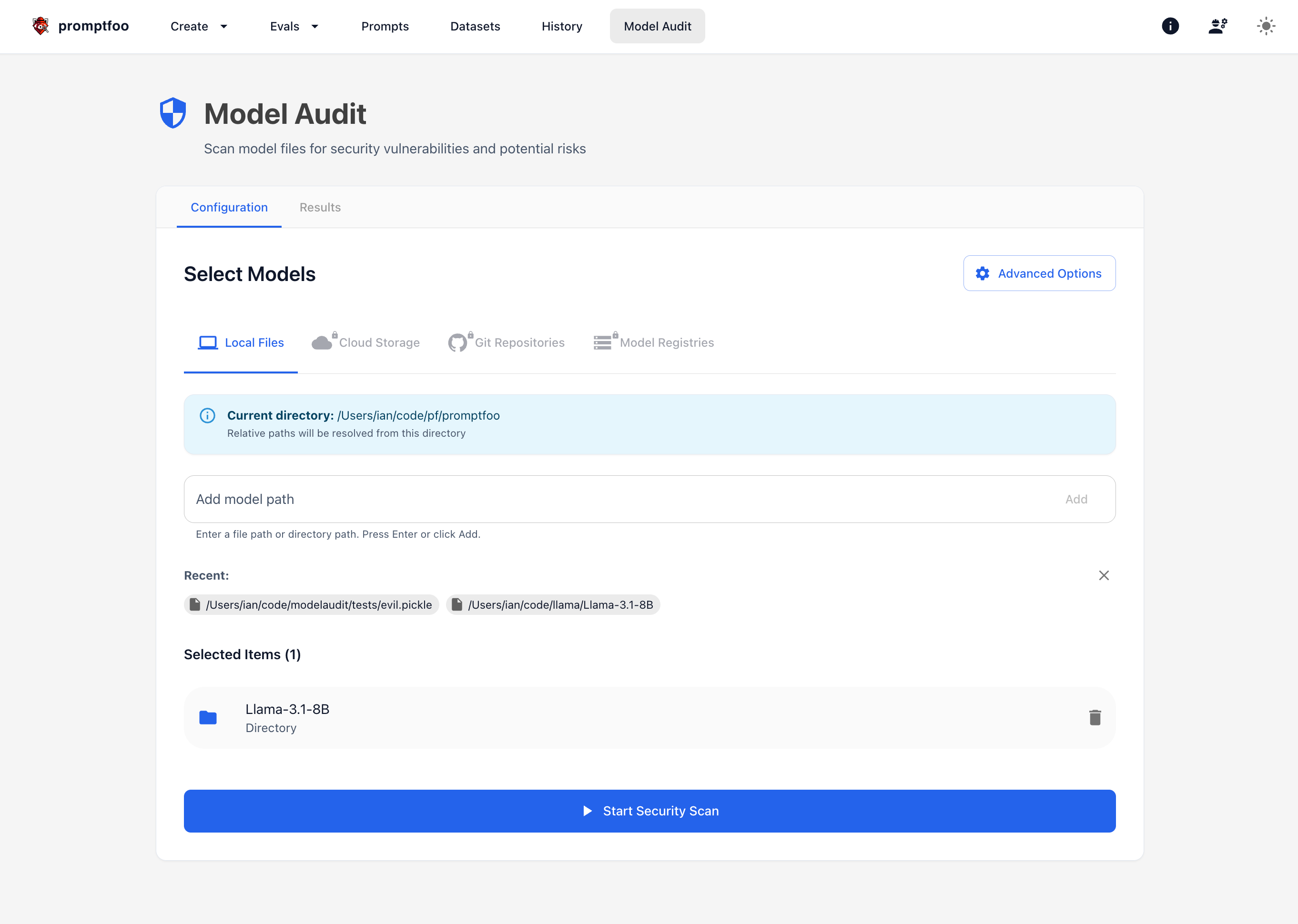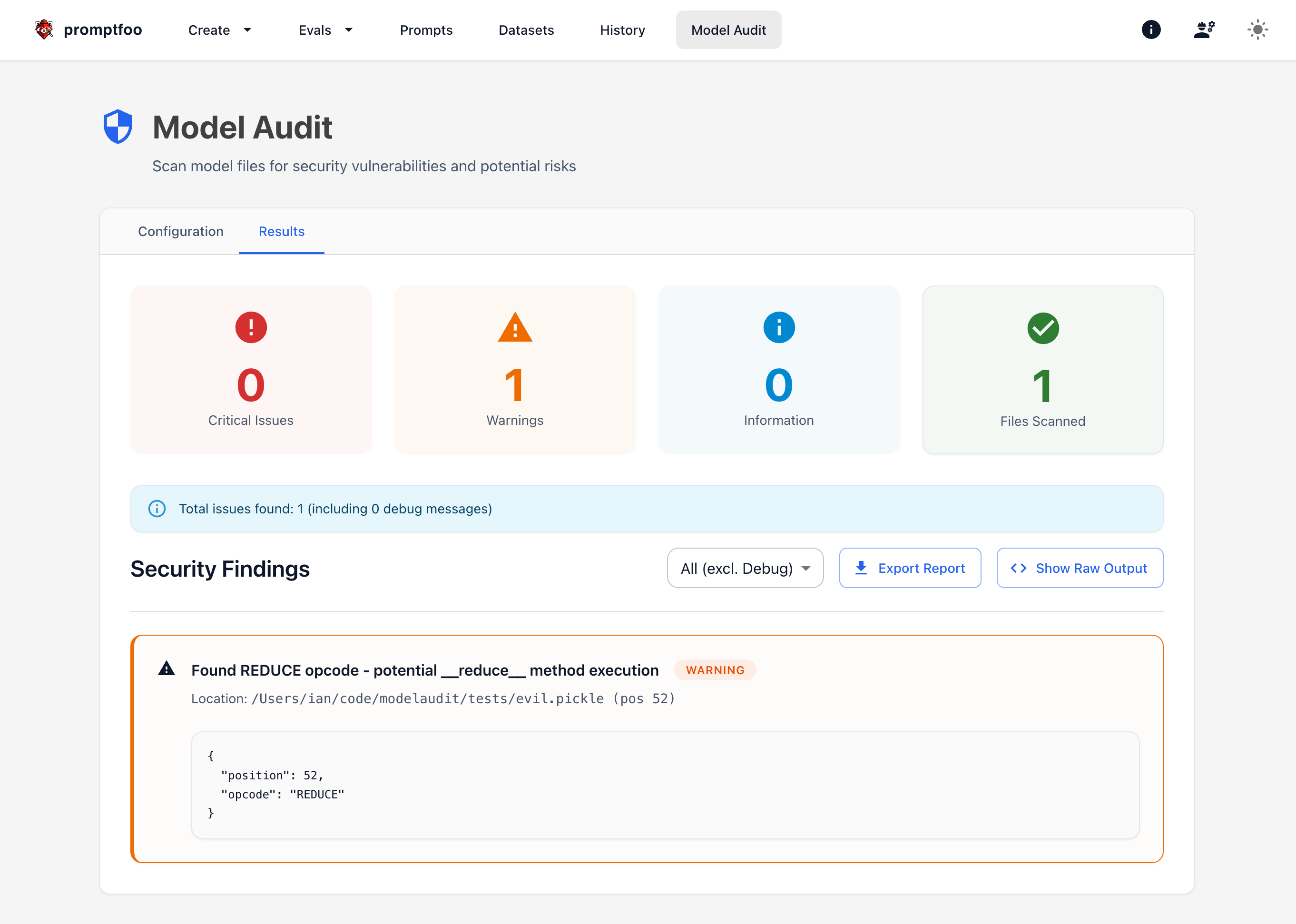Model Scanning
Overview
ModelAudit is a lightweight static security scanner for machine learning models accessible through Promptfoo. It scans AI/ML models for potential security risks before deployment.
Promptfoo provides a wrapper command promptfoo scan-model that integrates ModelAudit scanning capabilities.

Promptfoo also includes a UI that allows you to set up a scan:

And displays the results:

Purpose
AI/ML models can introduce security risks through:
- Malicious code embedded in pickled models
- Suspicious TensorFlow operations
- Potentially unsafe Keras Lambda layers
- Dangerous pickle opcodes
- Encoded payloads hidden in model structures
- Risky configurations in model architectures
- Malicious content in ZIP archives
- Embedded executables in binary model files
- Hidden credentials (API keys, tokens, passwords)
- Network communication patterns (URLs, IPs, sockets)
- JIT/Script execution in TorchScript and ONNX models
ModelAudit helps identify these risks before models are deployed to production environments, ensuring a more secure AI pipeline.
Installation
Using Promptfoo
The easiest way to use ModelAudit is through Promptfoo:
# Install Promptfoo globally
npm install -g promptfoo
# Install modelaudit dependency
pip install modelaudit
Standalone Installation
You can also install ModelAudit directly:
# Basic installation
pip install modelaudit
# With optional dependencies for specific model formats
pip install modelaudit[tensorflow,h5,pytorch]
# For all dependencies
pip install modelaudit[all]
# Or install specific components:
pip install modelaudit[tensorflow,h5,pytorch] # Core ML frameworks
pip install modelaudit[cloud,mlflow] # Remote model access
pip install modelaudit[numpy1] # NumPy 1.x compatibility
Docker
# Pull from GitHub Container Registry
docker pull ghcr.io/promptfoo/modelaudit:latest
# Use specific variants
docker pull ghcr.io/promptfoo/modelaudit:latest-full # All ML frameworks
docker pull ghcr.io/promptfoo/modelaudit:latest-tensorflow # TensorFlow only
# Run with Docker
docker run --rm -v $(pwd):/data ghcr.io/promptfoo/modelaudit:latest scan /data/model.pkl
Usage
Basic Command Structure
promptfoo scan-model [OPTIONS] PATH...
Examples
# Scan a single model file
promptfoo scan-model model.pkl
# Scan a model directly from HuggingFace without downloading
promptfoo scan-model https://huggingface.co/bert-base-uncased
promptfoo scan-model hf://microsoft/resnet-50
# Scan from cloud storage
promptfoo scan-model s3://my-bucket/model.pt
promptfoo scan-model gs://my-bucket/model.h5
# Scan from MLflow registry
promptfoo scan-model models:/MyModel/1
# Scan multiple models and directories
promptfoo scan-model model.pkl model2.h5 models_directory
# Export results to JSON
promptfoo scan-model model.pkl --format json --output results.json
# Export results to SARIF for security tool integration
promptfoo scan-model model.pkl --format sarif --output results.sarif
# Add custom blacklist patterns
promptfoo scan-model model.pkl --blacklist "unsafe_model" --blacklist "malicious_net"
# Enable verbose output
promptfoo scan-model model.pkl --verbose
# Set file size limits
promptfoo scan-model models/ --max-size 1GB
# Generate Software Bill of Materials
promptfoo scan-model model.pkl --sbom sbom.json
# Enable strict mode for security-critical scans
promptfoo scan-model model.pkl --strict
# Preview scan without actually processing
promptfoo scan-model model.pkl --dry-run
See the Advanced Usage guide for detailed authentication setup for cloud storage, JFrog, and other remote sources.
- Standalone: Install modelaudit directly using
pip install modelaudit.modelaudit scanbehaves the same aspromptfoo scan-model. - Web Interface: For a GUI experience, use
promptfoo viewand navigate to/model-auditfor visual scanning and configuration.
Options
| Option | Description |
|---|---|
--blacklist, -b | Additional blacklist patterns to check against model names |
--format, -f | Output format (text | json | sarif) [default: text] |
--output, -o | Output file path (prints to stdout if not specified) |
--timeout, -t | Scan timeout in seconds [default: 300] |
--verbose, -v | Enable verbose output |
--max-size | Maximum total size to scan (e.g., 500MB, 1GB) |
--sbom | Generate CycloneDX Software Bill of Materials with license info |
--strict | Fail on warnings; enable stricter validation |
--dry-run | Preview scan without processing files |
--quiet | Suppress non-critical output |
--progress | Force-enable progress reporting |
--no-cache | Disable caching of downloaded files |
--no-write | Skip writing results to database |
Web Interface
Promptfoo includes a web interface for ModelAudit at /model-audit with visual path selection, real-time progress tracking, and detailed results visualization.
Access: Run promptfoo view and navigate to http://localhost:15500/model-audit
Key Features:
- Visual file/directory selection with current working directory context
- GUI configuration for all scan options (blacklist patterns, timeouts, file limits)
- Live scanning progress and tabbed results display with severity color coding
- Scan history and automatic installation detection
Supported Formats
ModelAudit supports scanning 30+ specialized file format scanners across major ML frameworks:
Model Formats
| Format | Extensions | Description |
|---|---|---|
| PyTorch | .pt, .pth, .bin | PyTorch model files and checkpoints |
| TensorFlow SavedModel | .pb, directories | TensorFlow's standard model format |
| TensorFlow Lite | .tflite | Mobile-optimized TensorFlow models |
| TensorRT | .engine, .plan | NVIDIA GPU-optimized inference engines |
| Keras | .h5, .keras, .hdf5 | Keras/TensorFlow models in HDF5 format |
| ONNX | .onnx | Open Neural Network Exchange format |
| SafeTensors | .safetensors | Hugging Face's secure tensor format |
| GGUF/GGML | .gguf, .ggml, .ggmf, .ggjt, .ggla, .ggsa | Quantized models (LLaMA, Mistral, etc.) |
| Flax/JAX | .msgpack, .flax, .orbax, .jax | JAX-based model formats |
| JAX Checkpoints | .ckpt, .checkpoint, .orbax-checkpoint | JAX training checkpoints |
| Pickle | .pkl, .pickle, .dill | Python serialization (includes Dill) |
| Joblib | .joblib | Scikit-learn and general ML serialization |
| NumPy | .npy, .npz | NumPy array storage formats |
| PMML | .pmml | Predictive Model Markup Language (XML) |
| ZIP Archives | .zip | Compressed model archives with recursive scanning |
| Container Manifests | .manifest | OCI/Docker layer scanning |
| Binary Files | .bin | Auto-detected format (PyTorch, ONNX, SafeTensors, etc.) |
Remote Sources
| Source | URL Format | Example |
|---|---|---|
| HuggingFace Hub | https://huggingface.co/, https://hf.co/, hf:// | hf://microsoft/resnet-50 |
| Amazon S3 | s3:// | s3://my-bucket/model.pt |
| Google Cloud Storage | gs:// | gs://my-bucket/model.h5 |
| Cloudflare R2 | r2:// | r2://my-bucket/model.safetensors |
| MLflow Registry | models:/ | models:/MyModel/1 |
| JFrog Artifactory | https://*.jfrog.io/ | https://company.jfrog.io/artifactory/models/model.pkl |
| DVC | .dvc files | model.pkl.dvc |
Security Checks Performed
The scanner looks for various security issues, including:
- Malicious Code: Detecting potentially dangerous code in pickled models
- Suspicious Operations: Identifying risky TensorFlow operations and custom ONNX operators
- Unsafe Layers: Finding potentially unsafe Keras Lambda layers
- Blacklisted Names: Checking for models with names matching suspicious patterns
- Dangerous Serialization: Detecting unsafe pickle opcodes, nested pickle payloads, and decode-exec chains
- Enhanced Dill/Joblib Security: ML-aware scanning with format validation and bypass prevention
- Encoded Payloads: Looking for suspicious strings that might indicate hidden code
- Risky Configurations: Identifying dangerous settings in model architectures
- XML Security: Detecting XXE attacks and malicious content in PMML files
- Embedded Executables: Detecting Windows PE, Linux ELF, and macOS Mach-O files
- Container Security: Scanning model files within OCI/Docker container layers
- Compression Attacks: Detecting zip bombs and decompression attacks
- Weight Anomalies: Statistical analysis to detect potential backdoors
- Format Integrity: Validating file format structure
- License Compliance: Detecting AGPL obligations and commercial restrictions
- DVC Integration: Automatic resolution and scanning of DVC-tracked models
- Secrets Detection: Finding embedded API keys, tokens, and credentials
- Network Analysis: Detecting URLs, IPs, and socket usage that could enable data exfiltration
- JIT Code Detection: Scanning TorchScript, ONNX custom ops, and other JIT-compiled code
Interpreting Results
The scan results are classified by severity:
- CRITICAL: Definite security concerns that should be addressed immediately
- WARNING: Potential issues that require review
- INFO: Informational findings, not necessarily security concerns
- DEBUG: Additional details (only shown with
--verbose)
Some issues include a "Why" explanation to help understand the security risk:
1. suspicious_model.pkl (pos 28): [CRITICAL] Suspicious module reference found: posix.system
Why: The 'os' module provides direct access to operating system functions.
Integration in Workflows
ModelAudit is particularly useful in CI/CD pipelines when incorporated with Promptfoo:
# Example CI/CD script segment
npm install -g promptfoo
pip install modelaudit
promptfoo scan-model --format json --output scan-results.json ./models/
if [ $? -ne 0 ]; then
echo "Security issues found in models! Check scan-results.json"
exit 1
fi
Exit Codes
ModelAudit returns specific exit codes for automation:
- 0: No security issues found ✅
- 1: Security issues detected (warnings or critical) 🟡
- 2: Scan errors occurred (installation, file access, etc.) 🔴
In CI/CD pipelines, exit code 1 indicates findings that should be reviewed but don't necessarily block deployment. Only exit code 2 represents actual scan failures.
Requirements
ModelAudit is included with Promptfoo, but specific model formats may require additional dependencies:
# For TensorFlow models
pip install tensorflow
# For PyTorch models
pip install torch
# For Keras models with HDF5
pip install h5py
# For YAML configuration scanning
pip install pyyaml
# For SafeTensors support
pip install safetensors
# For HuggingFace URL scanning
pip install huggingface-hub
# For cloud storage scanning
pip install boto3 google-cloud-storage
# For MLflow registry scanning
pip install mlflow
NumPy Compatibility
ModelAudit supports both NumPy 1.x and 2.x. If you encounter NumPy compatibility issues:
# Force NumPy 1.x if needed for full compatibility
pip install modelaudit[numpy1]